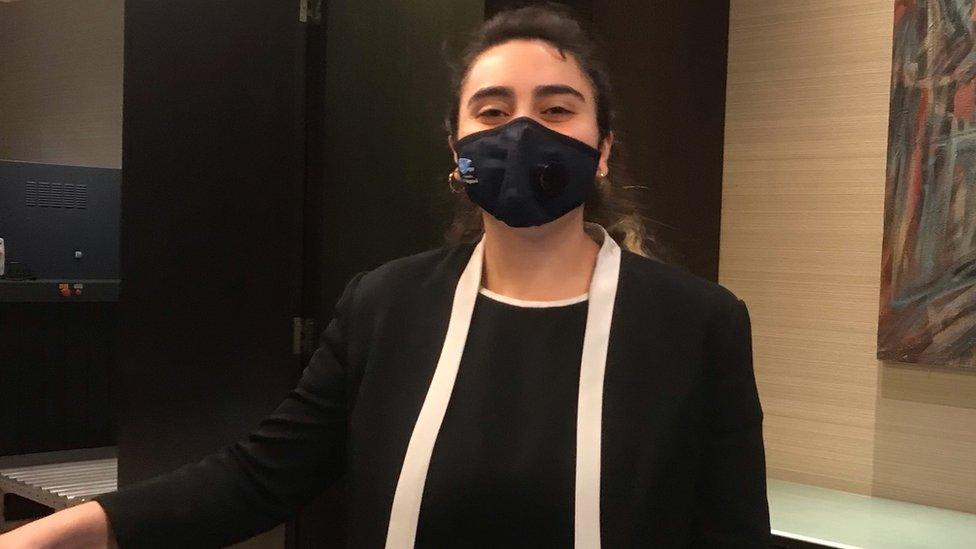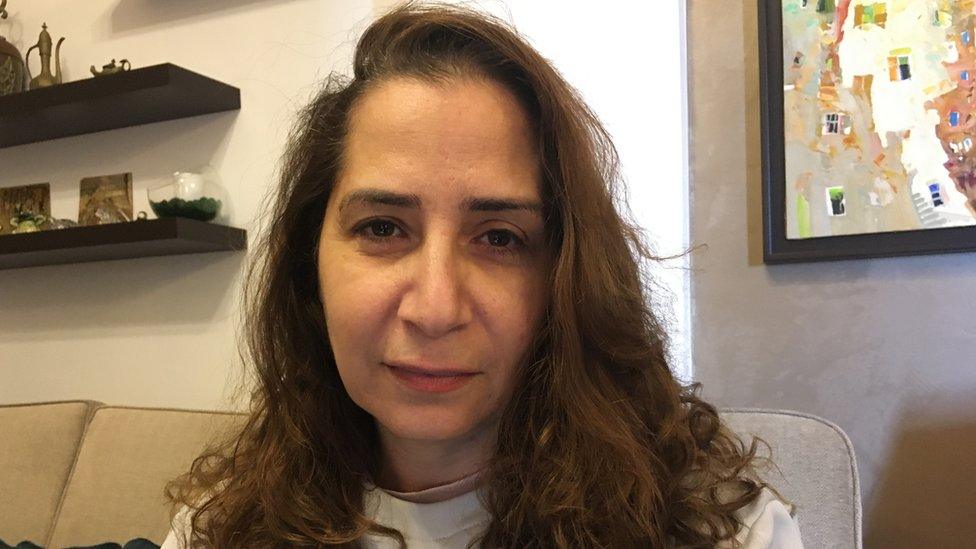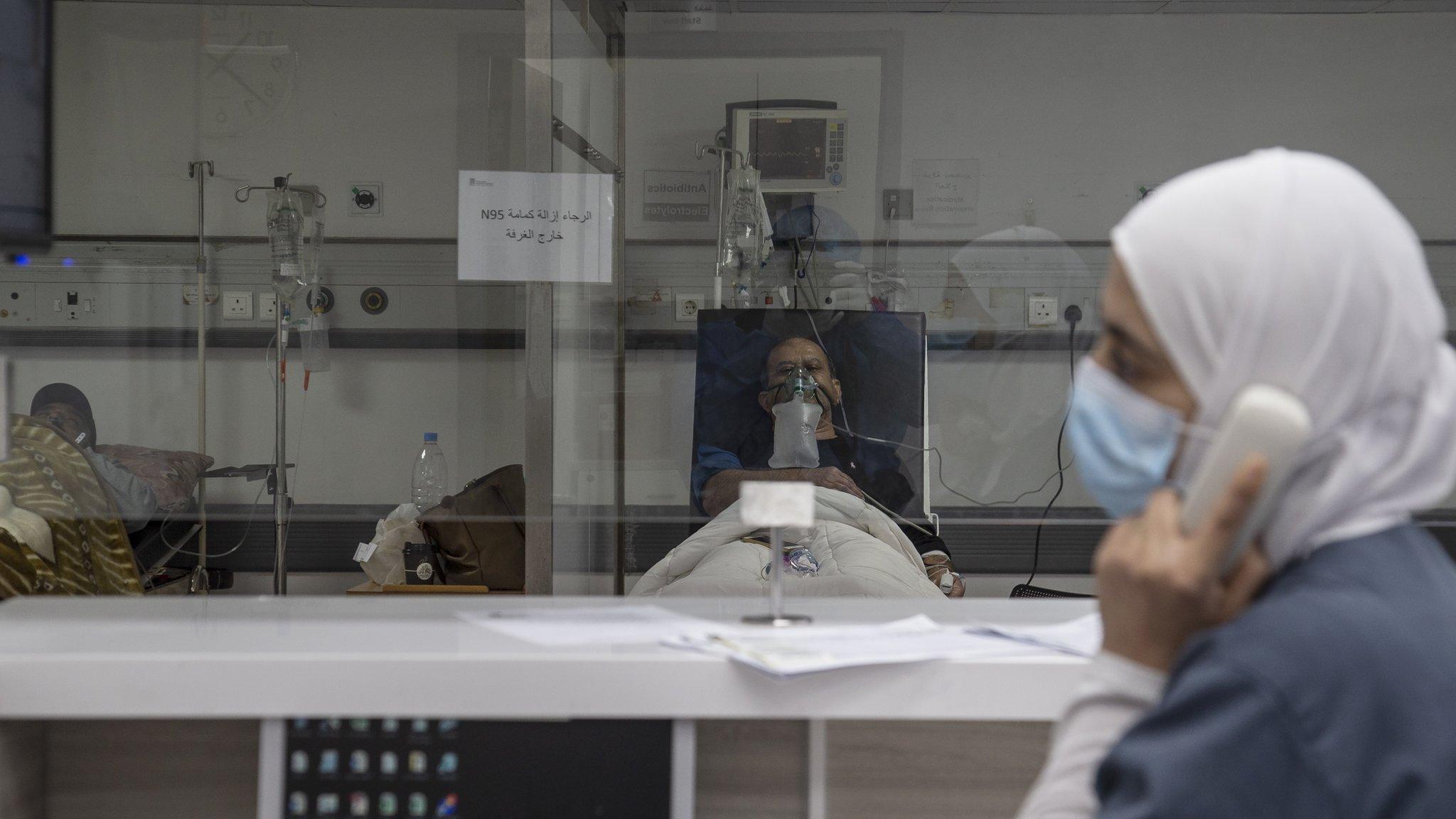Lebanon's Coronavirus lockdown: 'We can't leave our homes day or night'
- Published
People in Lebanon are living under one of the world's strictest lockdowns. Under the round-the-clock curfew, citizens who are not "essential workers" have been barred from leaving their homes since 14 January.
Here residents in the capital, Beirut, describe what it's like.
'I miss my friends'

Laila, 12, student
A few days into the 24-hour lockdown it had already got really hard as me and my family have to work in the same environment. Although it's good to spend more time with the family, we all have our own work to do and when we have meetings we hear each other. It can be a real distraction and stop you from finishing your work on time.
Sometimes I can't study well because I get stressed with all the work they're giving us. It is definitely not the same studying online as it is in the physical world where we can interact with the teacher and she can explain things one-on-one.
I miss my friends a lot even though we talk online, and I try to fill my spare time by watching movies, playing the piano, reading and dancing. I also paint at night.

'It is hitting hard'

Walid Kanaan, 45, hairdresser
This year has been extremely difficult psychologically and economically.
I own my shop but still I cannot afford it. I pay the workers' salary so I am really broke.
This latest lockdown is making me very nervous, not because of money but where we are now. People are now focused on how to eat, not how to live. Who cares about their hair or how they look?
It is hitting hard. You can't go out at all or do anything. My wife works in a bank and she is also collapsing. She doesn't know if she will still have her job or not.
It is everything - economic meltdown, money evaporated in banks, prices are up and even now we can't go out.
We don't trust the government that if they bring a vaccine it will be safe to take it. We can only pray for God to protect us.

'I pray this will end soon'
Mouna Sleiman, 58, Syrian refugee
This latest lockdown has been the hardest for me. Not only can I not go out to work and therefore not bring in any income, but me and my whole family got infected with coronavirus.
All our savings went on tests, medications and supplements to fight the disease. Staying at home is hard psychologically and economically.
I fled to Beirut in 2012 from the war in Syria and I live here with my daughter, her husband and their two children. I work day in, day out to support them and support my son and his family who are still in Aleppo. I normally cook for many families - for lunch or dinner parties - so I can make ends meet, but if I miss a day, it makes it harder to cover expenses.
I pray to God that this will end soon and we can resume life as before. I have a family to look after.

'You feel like you're not safe'

Rasha, 22, hotel receptionist
It has been very hard on us, especially people in the hotel industry who have to work with guests [quarantined upon arrival in the country at government-approved hotels].
We face problems with some of them, such as where they don't want to obey the rules, like when it comes to wearing masks or taking mandatory Covid tests. Some of the guests just don't understand that this is for their own health and our own safety.
Lockdown is also very hard for us because hotel minibus transfers for staff have been suspended, so I feel really sorry for the hotel workers who have to walk home or stay at the place they work in.
Some of us have lost our jobs, others are struggling to get paid. The management in this hotel are trying their best to keep us happy but when you're working through a pandemic and when you get to deal with people that don't understand how serious this is, you get frustrated and annoyed because you feel like you're not safe.
At the end of the day you have to work to provide for your family so this is very sad and I just wish God could give us some strength and patience to handle it.

'Education has been going down'

Roula Natour, instructor, Lebanese University
Personally I don't mind being at home but it drags you away from social life, from social interaction, and I miss the formality of getting dressed to go out.
I've been teaching at the university for almost 20 years, and while it's easier to give lessons online while sitting relaxed at home, it's harder to prepare. We're lucky that the sector of teaching has still been going on compared to other sectors, but the level of education has been going down in terms of not all students attending classes due to either lack of technology or lack of motivation.
Preparation-wise, it's harder to prepare, and sometimes you feel as if you are talking to yourself when there is minimum interaction with students.
First Year students are also not benefiting from the experience of real interaction they get from being at university.
Interviews by Narinder Kalsi

You may also be interested in:
Specially trained dogs in Lebanon are learning to detect coronavirus

UK LOOK-UP: How many cases in your area?
TESTING: What tests are available?

Related topics
- Published12 January 2021

- Published13 October 2020
